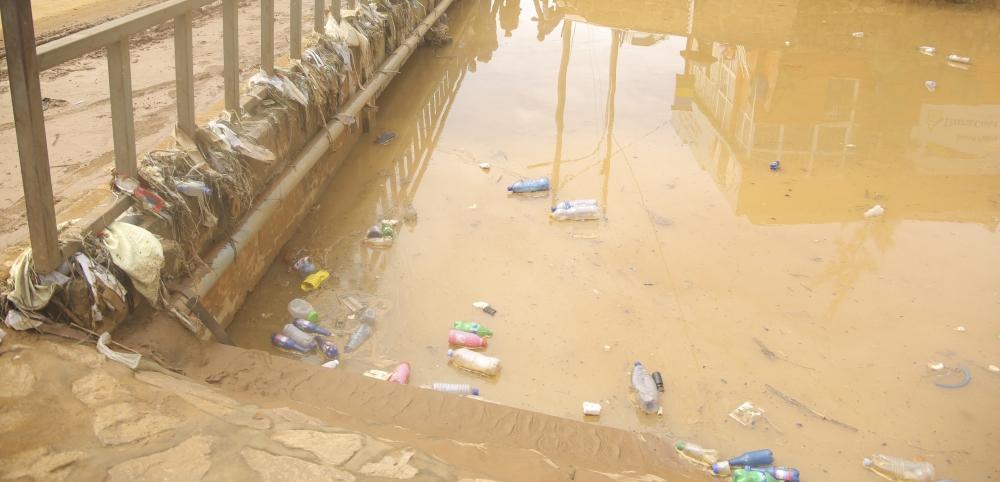Africa-Press – Rwanda. Nyabugogo river, a vital urban waterway in Kigali, is increasingly under threat from a range of pollution sources stemming from poor waste management practices, scientists have warned.
The issue was brought to light during a high-level dialogue on biodiversity conservation finance held in Kigali from June 25 to 27.
Nyabugogo river, a key tributary of the Nyabarongo River, ultimately feeds into the Nile Basin and supports a wide range of aquatic life, including fish, amphibians, and bird species. However, researchers say its ecological integrity is deteriorating rapidly.
According to environmental experts, the river is being contaminated by untreated wastewater, plastic waste, industrial runoff, and sedimentation caused by erosion.
“One of the major threats to Nyabugogo River is the leachate from Nduba landfill, which was not designed to prevent chemicals from seeping into groundwater,” said Josaphat Kanyeshuri, a lecturer and researcher in environmental studies.
“These pollutants eventually find their way into Nyabugogo and further into Nyabarongo River.”
Kanyeshuri added that garages in Gatsata Sector are also a major source of contamination, releasing hazardous waste—including heavy metals such as chromium, cadmium, and lead—into both the Nyabugogo wetland and the river.
Multiple sources of contamination
A 2024 report by the Rwanda Environment Management Authority (REMA) revealed that an illegal hides and skin tanning operation had also been discharging solid and soft waste directly into the Nyabugogo wetland.
Moreover, settlements along the riverbanks discharge untreated domestic wastewater into the river, compounding the pollution problem. Mining activities and upstream erosion are further contributing to the degradation of river ecosystems.
To tackle these challenges, several large-scale interventions are being implemented or planned:
1. Modern waste management facility in Nduba
A €67 million modern waste treatment facility is set to be constructed in Nduba Sector, Gasabo District, to replace the current open landfill.
The new facility will span over 50 hectares and is designed to prevent leachate from contaminating groundwater and soil.
In 2024, a bio-waste treatment plant capable of processing five tonnes of organic waste daily was also inaugurated at the site to produce organic fertiliser.
2. Kigali faecal sludge treatment plant
A faecal sludge treatment plant under construction in Masaka Sector, Kicukiro District, has reached 70 percent completion. It will treat sludge that was previously dumped at Nduba, thereby reducing contamination of Nyabugogo and other water bodies.
The €8.1 million facility will process up to 500 cubic metres of sludge daily using energy-efficient and nature-based methods.
3. Kigali Centralised Sewerage System
Slated to begin in June 2025, the Kigali Centralised Sewerage System will feature a 92-kilometre network to collect wastewater from Kigali, Nyarugenge, Muhima, and Gitega sectors.
The wastewater will be treated at a new plant in Giticyinyoni, with a daily capacity of 12,000 cubic metres. The treated water will be safely discharged, while residual sludge will be repurposed into fertilisers and energy.
The first phase of the project is estimated to cost over €96 million.
4. Nyabugogo wetland restoration
REMA is also spearheading the rehabilitation of five wetlands, including Nyabugogo, which play a crucial role in natural water filtration and flood control.
“This project will help restore the natural river profile, introduce stormwater treatment systems, and enhance biodiversity,” said Martine Uwera, REMA’s Programme Manager for Environmental Mainstreaming and Biodiversity Management.
Plans include infrastructure for flood control, a natural waterfront, and ecological restoration, positioning the wetland as a potential hub for environmental research.
For years, garages in the Gatsata area had operated without waste disposal systems, discharging toxic substances into the wetland and posing health risks to surrounding communities.
For More News And Analysis About Rwanda Follow Africa-Press






